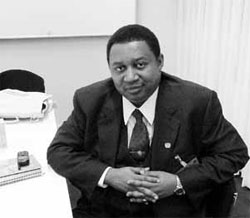Interview: Mohammed Barkindo
November 15, 2000
 MOHAMMED BARKINDO, leader of the Nigerian delegation and the G77 and China, talks about the priorities, expectations and the combined stand of 133 countries.
MOHAMMED BARKINDO, leader of the Nigerian delegation and the G77 and China, talks about the priorities, expectations and the combined stand of 133 countries.
What are the priorities of G77 and China?
For developing countries the main issues are those of sustainable development and of funding for generating means of alleviating poverty. It is very important that decisions at CoP-6 are based on equity. Transfer of ecologically sustainable technologies is also an area of priority.
What is the main threat to G77 and China?
The industrialised countries' failure in meeting the emissions reduction target as agreed. This is very disappointing.
You have raised an objection about deletion of negotiating text.
Proposals are made by parties on behalf of their governments. The rule is that all parties can negotiate, modify and amend text. There are always parties who feel they have some kind of divine right to determine which proposal should be included in the negotiating text. This is against the rules of the UN. This does happen and G77 has complained about this.
In your speech to the plenary, why did you criticise the attitude of leaving difficult issues for another day?
We are merely trying to remind the parties here that the Buenos Aires Plan of Action is a comprehensive package which requires a comprehensive package of decisions. They cannot be addressed or negotiated in isolation from one another. That is what has been referred to in the speech. Unfortunately, some parties go ahead and identify their areas of priority and wish that only those issues should be resolved here and other issues should be left till some other time. The Buenos Aires Plan of Action did not contemplate a piecemeal decision process. For example, it did not say that we should address issues of mechanisms and compliance and defer technology transfer, funding and capacity building to some time later. The package is a single package of decisions.
Share this article